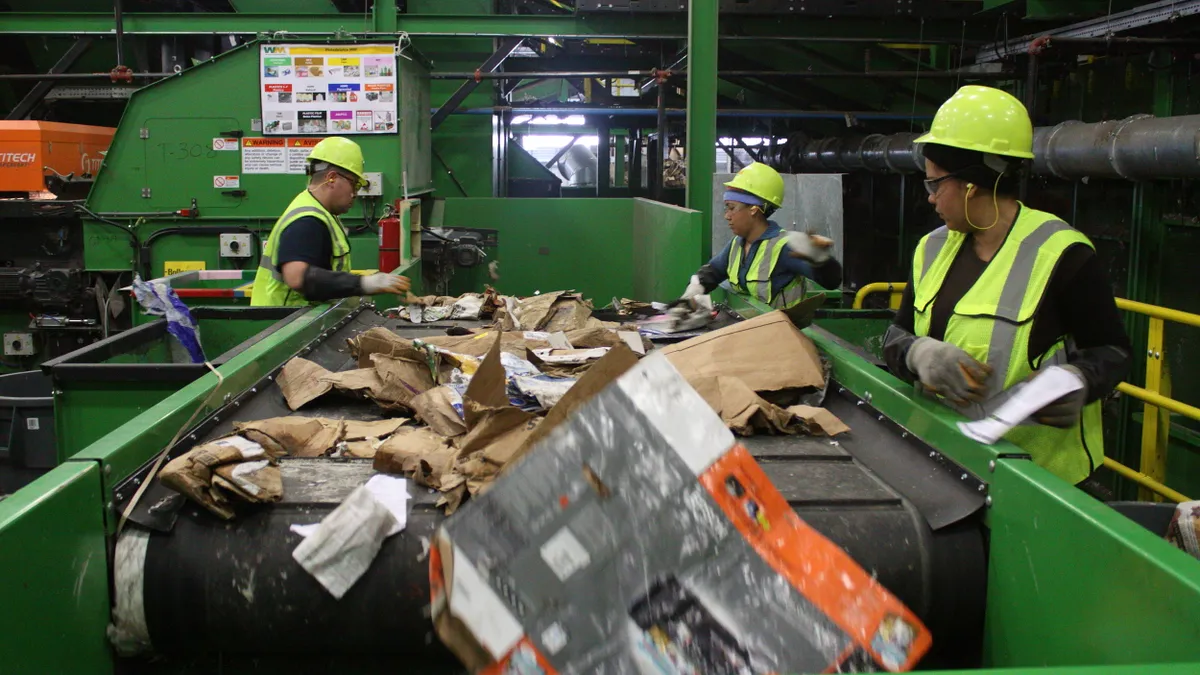UPDATE: May 19, 2020: After suspending operations at multiple California MRFs, Waste Management began resuming usual service earlier this month. Claremont (located in Los Angeles County) saw service return on May 4, according to the Claremont Courier. Chico (farther north in Butte County) had a similar announcement that week, per the Chico Enterprise-Record. Waste Dive has since confirmed similar moves are happening at all five of the company's affected facilities in the state.
"We have commenced processing operations at our California MRFs and are ramping up to be fully back online by the end of the month," said Waste Management spokesperson Janette Micelli.
Dive Brief:
- Waste Management suspended residential recycling operations at five California MRFs in March and issued a force majeure notice to municipal customers in the state, describing how the new coronavirus pandemic could prevent full contract compliance. The company confirmed to Waste Dive it is still processing commercial recyclables at these facilities.
- The company's decision has affected residential programs in multiple parts of the state – from the Sacramento area down into Los Angeles – along with parts of neighboring Nevada. Waste Management has also issued alerts regarding other service changes across 20 California counties.
- Multiple other MRFs have also limited operations in southern California, per the Los Angeles Times and Daily Press. Athens Services, CR&R Environmental Services and Advance Disposal Co. all took such steps in recent weeks.
Dive Insight:
California was one of the first states to institute a "stay-at-home" order, which appears to have caused some initial confusion about how it applied to the industry. While waste and recycling services have been deemed essential, companies are still grappling with how to protect workers and navigate liability issues. Keeping landfills and transfer stations open has remained a priority, but MRFs, drop-off sites, call centers and other facilities have been more widely affected.
Brent Bell, Waste Management's vice president of recycling, told Waste Dive the primary factor in this decision was that some residential sort lines aren't configured in a way that can meet social distancing guidelines. Staffing on the pre-sort line is especially important for the residential stream, as it tends to have higher inbound contamination than commercial material. California MRFs moreover rely more on export markets, which have stricter quality standards for fiber than some domestic partners are currently expecting. All of these factors prompted the force majeure notices, which the company said it hadn't acted on as of yesterday afternoon.
“Our intention is still to fully operate and fully run as long as we can make sure our employees are safe," said Bell in April. "We're preparing for the worst case on that, but our goal is really to keep as many facilities as possible where the employees can still process the material in a safe manner."
The city of Eastvale confirmed receiving its own notice, but declined to comment to Waste Dive on the situation any further. The letter outlines the temporary closure of residential call centers and multiple potential scenarios for service interruption.
Email exchanges obtained by Waste Dive through public records request show Waste Management communicated with Eastvale on March 20 about the COVID-19 pandemic. The company sent the force majeure notice at that time and said it was sent "to each of our municipal and county customers."
Bryan Jones, Eastvale's city manager, confirmed receipt of the email in an April 1 response and underscored that waste workers are considered essential workers under California's pandemic guidance. "Based on this, the City reasonably expects Waste Management will do everting within its power to continue to provide...these essential services," Jones wrote. He said the city will seek to work with Waste Management to avoid additional service delays and expect advance notice should any be anticipated.
Waste Management continues to collect residential material to avoid disrupting normal habits, but is not processing it in some cases, Bell said. The Chico-Enterprise Record reported Waste Management began diverting recyclables from the Sacramento area to a landfill in Butte County as of March 30.
Los Angeles County is also allowing contracted haulers to temporarily dispose of recyclables, due to MRF disruptions in the area. Athens Services was one of the companies to suspend hand sorting operations at its own area MRFs, effective March 18. The company declined to answer any questions from Waste Dive about its decision for at least one month.
LA Sanitation, which sends some residential recyclables to Athens and also oversees the city's commercial franchise program, could not be reached for comment as of publication.
In nearby San Bernardino County, the Department of Public Health, Division of Environmental Health Services gave Advance Disposal Co. approval to "temporarily suspend" operations at the company's MRF. Jason Phillippe, a program manager with the county, confirmed to Waste Dive the company applied for a temporary waiver request that remains in effect for 90 days and could potentially be renewed.
CalRecycle, the state's recycling agency, did not respond to a request for comment about its own response to these MRF limitations and program disruptions. The agency shared information on its website about the potential to waive permit standards during a declared state of emergency, as well as guidelines around recyclable material storage.
While California is currently among the most affected states when it comes to operational disruptions at MRFs, the effect has not necessarily been universal. Republic Services told Waste Dive in April it had not closed any MRFs in California, or elsewhere. Recology confirmed yesterday that, aside from slowing down the sort line at one facility to accommodate social distancing guidelines, it has also not altered any MRF operations.













